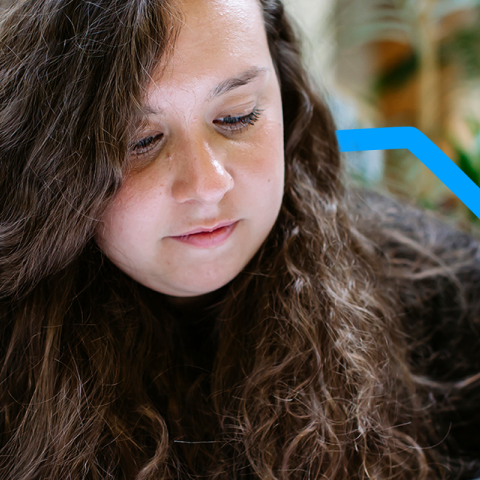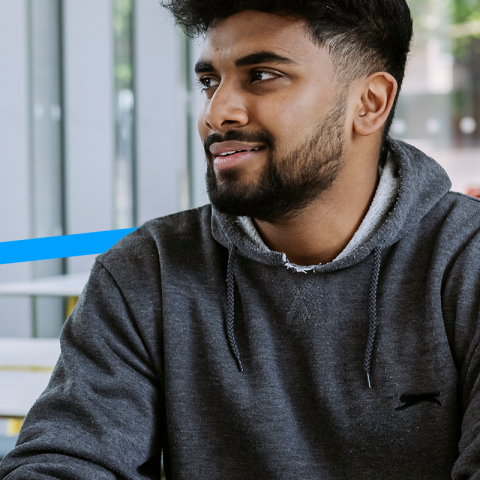
Showing content for section Overview
Overview
If you're a creative ready to take your studies to the next level, our MRes in Creative Industries is a postgraduate taught degree that can help you achieve your ambitions and land your dream job.
On this course, you'll complete a large research project and tailor your studies to match your career path, while receiving the support you need to develop your skills in research. You can choose to study in any of the schools within the Faculty of Creative and Cultural Industries: Architecture, Art, Design and Performance, Creative Technologies and Film, Media and Communication.
Whether you're planning to go on to further research – such as PhD study – or looking to start your career in a creative industry such as architecture, the media, teaching or the performing arts, then the MRes in Creative Industries will give you the skills you need to succeed.
And when you graduate, you'll do so with one of the following degrees, depending on what you choose to focus on:
- MRes Architecture
- MRes Creative Practice
- MRes Design
- MRes Design Practice
- MRes Digital Curation
- MRes Curation
- MRes Media Industries
- MRes Sustainable Innovation
- MRes Theatre Performance
- MRes Urban Design
- MRes Visual Culture
- MRes Visualisation
- MRes Journalism
Eligibility
This course accepts UK, EU, and International students.
Course highlights
- Conduct a detailed research project in the creative field of your choice
- Learn from experienced and enthusiastic staff who are experts in the field
- Get experience working in a productive research community, and benefit from satisfying intellectual challenges
- Take part in formal research training sessions, including peer and critical reviews, grant application, and conference presentation
- Have access to the faculty's sound and TV studios, technical labs which feature 3D printing facilities, photographic workshops, VR lab, motion capture facilities and computer suites, and our 92-seat theatre with lighting, sound and AV technology
- Have 24/7 access to our library's resources, including books, ejournals and DVDs
The University of Portsmouth is ranked third of all modern post-92 universities in the UK for research power
Research Excellence Framework (REF) 2021
Contact information
Contact AdmissionsEntry requirements
Eligibility
This course accepts UK, EU, and International students.
September 2024 / January 2025 start
- A second-class honours degree in a related subject.
Please get in touch if you're not sure if your undergraduate subject is relevant to this degree.
Equivalent professional experience and/or qualifications will also be considered, such as previous study, employment, voluntary work and training courses, including courses and qualifications you didn't complete. Learn more about our Recognition of Prior Learning (RPL).
If you're applying as an international student with a non-UK degree, you’ll need to show you meet the UK entry requirements listed above.
To find out if your non-UK degree or other qualification is accepted, please visit our page for your country and view the UK equivalent of your qualification.
- English language proficiency at a minimum of IELTS band 6.5 with no component score below 6.0.
You do not need an IELTS or equivalent certification if:
- you have a UK degree
- you have a degree from a majority English-speaking country (not taught by Distance Learning)
- you are a national of a majority English-speaking country
Degrees taught solely in English from non-majority English-speaking countries will be considered on a case-by-case basis. Find out more about our English language requirements.
If you do not meet the English language requirements yet, you can achieve the level you need by successfully completing a pre-sessional English programme before you start your course.
You will be asked to write a short research proposal upon receipt of your application.
Applicants may be invited to attend an interview.
For more information on how to write your research proposal, read our MRes Creative Industries research proposal guide.
Modules
What you'll study (full-time and part-time)
You’ll review academic literature to create a firm base for your study. By thinking about different philosophies and methods, you’ll plan out the right way to do your research. This module lets you explain how your work adds to the field and think critically about what you need to learn.
By the end, you’ll have the tools and context to put together a research project that really makes a difference and helps you reach your goals.
You’ll use careful methods to gather and study data, leading to findings you can share with others. This module gives you a chance to showcase your intellect and technique by creating a detailed paper, an object, or a mix of both. You can come up with new ideas that improve knowledge and practice.
You’ll set realistic goals and explain why your approach makes sense. In the end, you’ll have an impressive study that can help both the research world and professionals in your field.
Changes to course content
We use the best and most current research and professional practice alongside feedback from our students to make sure course content is relevant to your future career or further studies.
Therefore, some course content may change over time to reflect changes in the discipline or industry. If a module doesn't run, we'll let you know as soon as possible and help you choose an alternative module.
Careers and opportunities
The MRes in Creative Industries will place you in a strong position to pursue doctoral or research related roles as a career. You'll graduate from the course with valuable research skills and training, which will place you in a strong position to secure employment across private and public sector industries.
Areas you can go into with a Creative Industries degree
Career opportunities include:
- Research-related careers
- PhD study
- Architectural or creative practice
- Curation
- Design
- Teaching
- Theatre Performance
It was one of the only courses in the UK that gave me flexibility of study and the support I needed, as well as the facilities in the Eldon Building. On the open day, everyone was also extremely friendly. I can join onto modules from other courses, tailored to my research for the year.
Work experience and career planning
When you finish the course, our Careers and Employability service can help you find a job that puts your skills to work in the creative and cultural industries.
After you leave the University, you can get help, advice and support for up to 5 years from our Careers and Employability service as you advance in your career.
How you'll spend your time
We recognise that you'll probably be juggling more demands when you do your Master's degree, as you may be working or you may have family responsibilities.
We'll give you as much indication here as we can of how much time you'll need to be on campus and how many hours you can expect to spend in self-directed study, but please note that these indications are always subject to change. You should receive your full timetable several weeks before you start with us.
Teaching
Teaching methods on this course include:
- taught sessions
- face-to-face meetings
- independent study
How you're assessed
You'll be assessed through:
- project proposal
- literature review
- reflective practice
- presentations
- dissertation
Supporting your learning
Master's study is more focused on independent learning than undergraduate study, but you'll get lots of support via video, phone and face-to-face from teaching and support staff to enhance your learning experience and help you succeed. You can build your personalised network of support from the following people and services:
Types of support
Your personal tutor helps you make the transition to independent study and gives you academic and personal support throughout your time at university.
You'll have regular contact with your personal tutor in learning activities or scheduled meetings. You can also make an appointment with them if you need extra support.
You'll have help from a team of faculty academic skills tutors. They can help you improve and develop your academic skills and support you in any area of your study.
They can help with:
- improving your academic writing (for example, essays, reports, dissertations)
- delivering presentations (including observing and filming presentations)
- understanding and using assignment feedback
- managing your time and workload
- revision and exam techniques
As well as support from faculty staff and your personal tutor, you can use the University's Academic Skills Unit (ASK).
ASK provides one-to-one support in areas such as:
- academic writing
- note taking
- time management
- critical thinking
- presentation skills
- referencing
- working in groups
- revision, memory and exam techniques
If you require extra support because of a disability or additional learning need our specialist team can help you.
They'll help you to
- discuss and agree on reasonable adjustments
- liaise with other University services and facilities, such as the library
- access specialist study skills and strategies tutors, and assistive technology tutors, on a 1-to-1 basis or in groups
- liaise with external services
Our online Learning Well mini-course will help you plan for managing the challenges of learning and student life, so you can fulfil your potential and have a great student experience.
You can get personal, emotional and mental health support from our Student Wellbeing Service, in person and online. This includes 1–2–1 support as well as courses and workshops that help you better manage stress, anxiety or depression.
Library staff are available in person or by email, phone, or online chat to help you make the most of the University’s library resources. You can also request one-to-one appointments and get support from a librarian who specialises in your subject area.
The library is open 24 hours a day, every day, in term time.
If English isn't your first language, you can do one of our English language courses to improve your written and spoken English language skills before starting your degree. Once you're here, you can take part in our free In-Sessional English (ISE) programme to improve your English further.
Course costs and funding
Tuition fees (September 2024 / January 2025 start)
Fees subject to annual increase.
- Full-time: £8,900
- Part-time: £2,970 (Year 1—60 credits) and £5,930 (Year 2—120 credits)
(including Transition Scholarship)
- Full-time: £8,900
- Part-time: £2,970 (Year 1—60 credits) and £5,930 (Year 2—120 credits)
- Full-time: £17,200
- Part-time: £5,840 (Year 1—60 credits) and £11,360 (Year 2—120 credits)
Explore how to fund your studies, including available scholarships and bursaries.
If you're a UK student, you may be eligible for a Government Postgraduate Master's Loan, which you can use to help with course fees and living costs.
Tuition fees terms and conditions
Funding your studies
Find out more how to fund your studies, including the scholarships and bursaries you could get. You can also find more about tuition fees and living costs, including what your tuition fees cover.
If you're a UK student, you may be eligible for a Government postgraduate loan, which you can use to help with course fees and living costs.
Applying from outside the UK? Find out about funding options for international students and our international student scholarships.
Loans, scholarships and bursaries
Browse funding such as the Government Postgraduate Loan, our scholarships for new and returning students, and subject specific loans.

Funding for international students
Learn more about sponsorships, scholarships and loans for students applying from outside of the UK.

Fees and funding for Master's courses
Explore Master's funding options, including loans, scholarships, bursaries and more.

Additional course costs
These course-related costs aren’t included in the tuition fees. So you’ll need to budget for them when you plan your spending.
How to apply
Unlike undergraduate applications, which go through UCAS, applications for this Master's course are made directly to us.
There's no deadline for applications to this course. We accept applications right up until the start dates in September and January, as long as there are places available. If you wait until your start month to apply, you may find that the course is full.
If you're applying as an international student, remember that you'll need to leave plenty of time to get your visa organised.
You can find more advice about applying in our Master's application checklist. International students and current students and recent graduates of the University of Portsmouth also have some different application options, which are detailed below.
Ready to apply?
Start this course in September 2024
Start this course in January 2025
After you apply
Once we receive your application, we may ask you for further information. We will then either make you an offer or suggest alternatives if your application is unsuccessful.
You'll usually get a decision within 10 working days, so you shouldn't have to wait too long. Some courses have an interview stage – we'll let you know if you need to prepare for one.
Learn more about how we assess your application.
Admissions terms and conditions
When you accept an offer to study at the University of Portsmouth, you also agree to abide by our Student Contract (which includes the University's relevant policies, rules and regulations). You should read and consider these before you apply.
